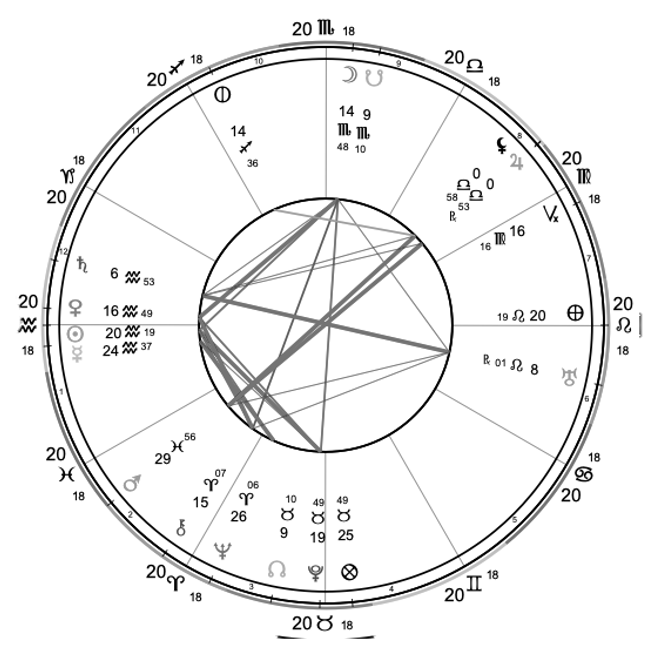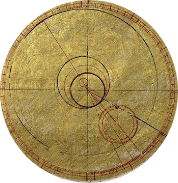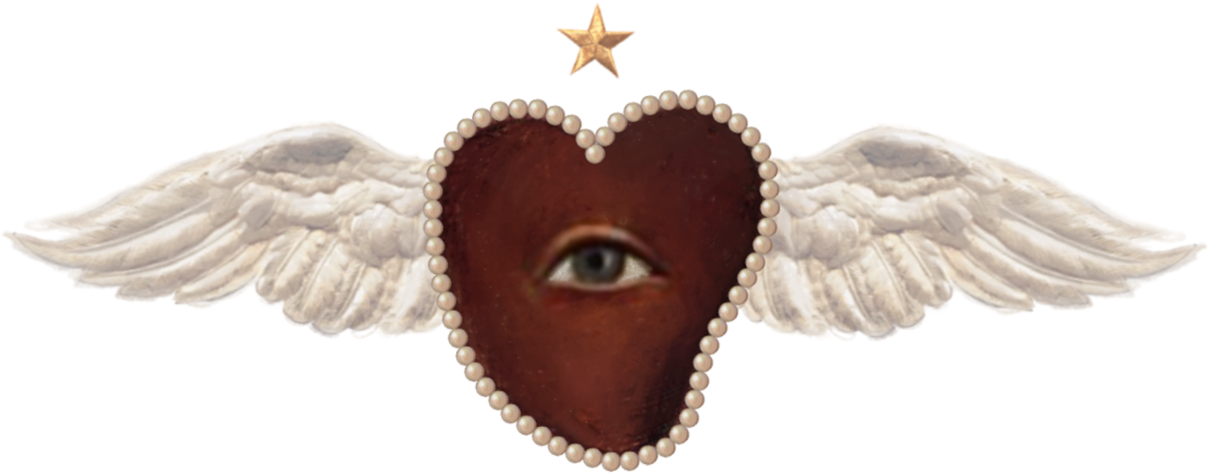The objective of the creative spirit is to immortalize itself, to turn ephemeral physical life into personal immortality. In Hegel’s 01 understanding such individual artist-type figures are not made; they form themselves completely into what they are; they become that which they 'will' to be, and to that they remain true. All art-form is in fact the externalisation of personality, a part of the human ongoing historical drive to manifest its consciousness outside of the mind, and in front of the eyes.
Stellar Wheel

aquarius



Vsevolod Meyerhold
01Hover over these to get the full astrological reference
BY SANJA KLJAIĆ
10 minute read
10 minute read
Realm of the Eight-Pointed Star Chakra
To add style to the character, a creative goes to great lengths to discover and develop their personality. As a result of this, the ‘creator impulse’ and deeper knowledge of one’s personality will further motivate artistic production and lead one to a better understanding of the development of their art. Such was the case with renowned Russian theatre director, actor, producer, and mastermind Vsevolod Emilievich Meyerhold.
His provocative and unconventional work sprung from his unique Aquarian personality 02 and ideology as an individual. The Aquarius archetype crumbles the old paradigm and looks beyond the small and limited self - to the greater ‘I Am’ that is the entire universe. He embodies the spirit of the eight-pointed fixed Star - the guiding light that transmits tremendous inspiration from the infinite cosmos above in the earth below. Aquarius stands at the doorway to the 11th portal 03 and leads one to unrestrained Ain Sof Aur - limitless energy of celestial Uranus 04
The water bearer pours forth the waters of wisdom, reminding us to never relinquish our powers to kings, priests, lords and gurus and to always follow our dreams. Aquarian is openly opposed to customs of the establishments and as such brings an alternative law unto itself 5 6.
Irrespective of the chosen profession, art form, and/or lifestyle, the Aquarian is the propagator of freedom; his energy seeks to help humanity to evolve its view of itself, to see itself in the intriguingly new and wonderous way 7 8.
Standing in front of the portal of the Aquarius constellation of stars, let us together, in concert, tap into the collective dream of our mythology. As we get closer to this living, breathing intelligence, let us honour our stellar existence, find meaning - connection and recognise each other's strengths as our own. The venerating grace of this cosmic force has called you here, honour this unfailing knowing.
Meyerhold was revered in variety and multiplicity like the star of his birth. He was an ardent defender of the free spirit who held in awe Commedia dell'arte. He applauded diversity and believed that the truth of life will not be found on realistic surfaces but beneath them. He was known to cherish the dance and drama of the Japanese Kabuki, the Spanish theatre plays, and the silent comedy of Chaplin and Keaton. Witnessing Isadora Duncan’s free and natural movements moved him to tears.
Having the loftiest conceptions of his calling, Meyerhold wanted to invent a new theatre with abstract plays like Tchaikovsky’s sensual symphony, a theatre that was unashamedly theatrical in its delivery, a theatre with new words and dreamlike new forms that would make the audience wish they could jump out of their seats.
“When a performer appears on stage his duty is to transport the spectator to a world of make-believe”.

To give a sketch of his life, we should probably take a brief look at Meyerhold's early upbringing. He was the youngest of eight children born to Elisabeth and Friedrich, an affluent middle-class family 910. His father was a wine manufacturer and a businessman, and his mother’s passion lay in music and theatre. Meyerhold remembers growing up under the influence of his mother, who was a lover of lively artistic culture 11 12 13. As a young boy, he was impressed with the great actors of the day at the local theatre of his native Penza, a city southeast of Moscow, where his family had a box.
Untouched by his father’s mercantile values, Meyerhold enjoyed the typical upbringing of a nineteenth-century middle-class Russian liberal 14. He entered Moscow University to study law. Upon seeing Stanislavsky’s production of Othello, the possibility of a career in theatre 15 began to stir in his mind, and soon enough, Meyerhold left the university and dedicated himself to his dream 16.
Meyerhold was fortunate to have in Vladimir Nemirovich-Drachenko 17 a teacher who gave him and his fellow students ‘a literary ground’ and taught them the analysis of character. Nemirovich-Drachenko reports that Meyerhold was the first student who constantly strived for the new in himself - in his life and in his art, endlessly calibrating himself towards the ‘higher human.’ He read avidly in a study, scribbling notes in the margins 18 and extracting value from every book he got his hands on.
Nemirovich-Drachenko did not care for the classical theatre he saw in late 19th-century Russia and demanded urgent reformation. Konstantin Stanislavski 19 held the same views. The two giant visionaries met and pondered for hours and agreed to create MAT, the Moscow Art Theatre, where only the works of contemporary writers, such as Anton Chekhov 20 and Maxim Gorky 21 would be staged. They demanded that the actors read and research extensively and show internal justification of the role by studying the self and the milieu in which the plays’ heroes lived.
Meyerhold, needless to say, had an enormous advantage in learning from Nemirovich-Danchenko’s work and his later collaboration with Stanislavski “if I have become somebody, it is because of the years spent alongside him.” Meyerhold admired his mentors and was impressed with their directorial skills, but he also shared a clash of divergent ideas with them and felt that theatre once more was ready for expansion and it needed a particular individual to light the path forward 22, citing:
“Are we as actors required merely to act? Surely, we should be thinking as well. We need to know why we are acting, what we are acting for, and whom we are instructing or attacking through our performance. And to do that we need to know the psychological and social significance of the play, to establish whether a given character is positive or negative, to understand which society or section of society the author is for or against.”
Meyerhold regularly sought advice from Chekhov, his friend, and protector, and Chekhov religiously followed Meyerhold’s ‘rebirth on the horizon’ advancement. Something new was being born in his soul, something that he knew would branch out and flourish abundantly.
What impressed the shrewdest observe was Meyerhold’s most striking intellectual quality that swiftly progressed him from an actor into a director 23. Meyerhold deeply identified with his restless desire for change and with ardent fever forged towards Symbolism and a theatre of stasis.
“the stage is a world of marvels and enchantment; it is breathless joy and strange magic” 25.
Notorious for being difficult to work with, he despised anything predictable 26 27 and preferred to explore deep into the bizarreness of tragedy and comedy, life and death, beauty and ugliness. This Aquarian Air didn’t waste time starting the conversation with conventional remarks, and social conventions meant very little to him. He wanted to weave his own story, move with the times and learn from the people who defined those times 29
He vigorously fixated his energy on perusing two major ideas brought forth by Ivan Pavlov 30 and Frederick Winslow Taylor 31. From Pavlov, Meyerhold borrowed ‘we don’t act but react’ in response to different stimuli of our environment. From Taylor, he adopted the idea of worker efficiency.
The two ideas interlaced into one, and Meyerhold’s famous Biomechanics for theatre metamorphosised into being. He divined a series of twenty-two biomechanical exercise movements, intuitively loosening himself in them, enacting a drama through dance and postures. An actor, like the shaman, evokes the delicate varied nuances of the soul by assuming and practicing poses and movements to portray a specific character, consistently reminding the viewer of the divinity that lives in physicality 32.
Meyerhold's Biomechanics were designed to boisterously awaken a response in the soul and foster in the actor a sense of complete self-awareness and self-control in performance. Action! Sensation! Expression! One single movement, if generated correctly by the body - shows the fate of a human unfolding - whenever is needed at a moment’s notice.
“Each exercise is a melodrama; each movement gives the actor a sense of performing on the stage. If my means of expression are not equal to my intention then my emotions will have no impact, I may sob, even die on stage, but the audience will feel nothing if I lack the means of conveying to them what I want."
But it was not through physical training alone that biomechanics was intended to correct this lack of self-control; the function of the actor’s intelligence was paramount. The great art of biomechanics earned Meyerhold a title as the forefather of ‘physical theatre. He was the first theatre director to be awarded the title of ‘People’s Artist of the Republic.’
With Russian society entering a new volatile phase, his presence as a theatrical figurehead was deemed too dangerous. Stalinist terror by the government cast a scornful gaze on Meyerhold's work and declared it antagonistic and alien to the Soviet people. After a lifelong career of innovation and theatrical experimentation, Meyerhold was arrested, resorted to unnecessary 'examen rigorosum,' tortured for days, and secretly executed. Shortly afterward, his wife, Zinaida Reich, whom he loved with obsessive devotion, was murdered too.
Paranoid uncle Stalin 33, of course, never set foot in the auditorium. He feared that all avant-garde art and experimentation might lead the whole nation into elucidation. His regime can best be described in Chekhov’s words:
“What a fine weather today! Can’t choose whether to drink tea or to hang myself.”
Despite all the sorrow, Meyerhold believed in the revolutionary spirit of people where kul’tura is its secular religion and where the writer is its second government. He was the embodiment of the rising generation of artists and intellectuals whose belief in theatre's inspirational and transformational power was as infectious then as it is today.
Literary source:
Braun, E. 1995 Meyerhold: A Revolution in Theatre, UK: Methuen Publishing.
Dianina, K. 2013 When Art Makes News: Writing Culture and Identity in Imperial Russia (NIU Series in Slavic, East European, and Eurasian Studies) US: Northern Illinois University Press.
Gerould, D. C 2000 Theatre Theory Theatre: The Major Critical Texts from Aristotle and Zeami to Soyinka and Havel, US: Performing Arts Publishing Group.
Nemirovich-Drachenko: Theatre as life.
https://www.rbth.com/arts/2013/12/28/nemirovich-danchenko_theater_as_life_33037.html
Rank, O. 1989 Art and Artist: Creative Urge and Personality Development, US: W.W. Norton & Company
Braun, E. 1995 Meyerhold: A Revolution in Theatre, UK: Methuen Publishing.
Dianina, K. 2013 When Art Makes News: Writing Culture and Identity in Imperial Russia (NIU Series in Slavic, East European, and Eurasian Studies) US: Northern Illinois University Press.
Gerould, D. C 2000 Theatre Theory Theatre: The Major Critical Texts from Aristotle and Zeami to Soyinka and Havel, US: Performing Arts Publishing Group.
Nemirovich-Drachenko: Theatre as life.
https://www.rbth.com/arts/2013/12/28/nemirovich-danchenko_theater_as_life_33037.html
Rank, O. 1989 Art and Artist: Creative Urge and Personality Development, US: W.W. Norton & Company
Image references:
1. Special Music and Theater issue of MA from the summer of 1924, MoMA Library.
2. Béla Kádár Dancers 1940
3. En attendant Godot, texte de Samuel Beckett, mise en scène de Otomar Krejca. Festival d'Avignon. 1978 / photographies de Fernand Michaud 1978
4. Anton Josef Trčka 1926 Eurythmische Tänzerinnen, Wikipedia open source
1
Wilhelm Hegel’s philosophical concepts are:
1) history plays an important part in our becoming;
2)learn from ideas you dislike; any progress is messy;
3)all arts have a major job to do; we need them so that important insights can be powerfully realised in our lives.
1) history plays an important part in our becoming;
2)learn from ideas you dislike; any progress is messy;
3)all arts have a major job to do; we need them so that important insights can be powerfully realised in our lives.
2
Sun in Aquarius in the 1st house is a walking visionary. A mind open to REVELATION. An awakening, multifaceted star reaching a new level of consciousness. Forging ahead of everyone. Sun conjunct Mercury in the 1st house is a battery ready to zap a viewer into a new way of seeing the world.
3
11th house deals with fortune, future, dreams,
friendships, social collective, quantum metaphysics, and higher cosmic
understandings. Also, the abundance that comes from career achievements.
4
Uranus, the grand vizier of the King, emanates divine rays of activation. It strikes like electricity, blasting the foundations of the old to make way for the new.
5
Aquarius often finds himself drawn to innovative technologies and progressive ways of functioning in society. This is because they carry the memory of ancient Atlantis, where people lived in an awakened 5D consciousness
6
The Aquarian archetype within you helps to
awaken that golden Atlantean consciousness, encouraging you to dream of the future
and have a sense of personal mission even if you do not know what that is.
7
Aquarian energy in the chart indicates a game-changer. They rip the rug from underneath you to show you the light of a different realm.
8
Regardless of the house it transits or finds itself in, it asks us to bring forward new, innovative, higher perspectives. The water bearer triggers personal ascension; his ruler triggers collective ascension.
9
Part of Fortune in Taurus in the 4th house indicates that a ‘pot of gold’ has been passed down through the family, home environment, and early upbringing. There is an element of a firm family foundation, a house with strong roots.
10
Also, this position shows that Meyerhold derived his fulfillment from building and sustaining his inner foundation, which later contributed to his creative endeavors.
11
In Meyerhold's chart, Eris in Pisces/1st house is influenced by Moon/ 9th house and Pluto/3rd house. Eris is the feminine warrior energy that one feels only if they are following their true calling.
12
Meyerhold’s mother, Elisabeth, triggered the young boy’s calling (Moon trine Eris) and his powerful desire to act and do something revolutionary.
13
Elisabeth, on some level, must have had the same urge to break through the limitations of 19th-century society and express her creative and mental energies (Moon opposite Pluto). Wanting to see a better society emerge from the vagaries of the present day.
14
Multilingual capacity (Mercury in sextiles Neptune)
15
Sun’s ruler Uranus in the 6th house in Leo. Leo asserts, “I have talent; I know that I am good.” Meyerhold said that acting was his most cherished dream, which he had thought about since he was five.
16
Saturn in opposition to Uranus indicates that without self-restriction, there is no craftsmanship. Service to others for the purpose of shifting consciousness.
17
Nemirovich was the heart of the Art Theatre, a literary man with an intuitive eye for great writing. It was he who first recognised the dramatic talent of Anton Chekhov.
18
Meyerhold needed to understand what theatre truly is to be able to teach new ways without too much emotional emersion (Mercury in Aquarius in the 1st house).
19
Stanislavski was the soul of the Art Theatre, a stage actor and director who developed the naturalistic performance technique known as the "Stanislavsky method."
20
Chekov (Sun and North node in Aquarius) was a doctor who devoted himself to literature. His plays are filled with murders and suicides and life and characters that drink, dance, and squabble—the everyday human conditions captured with mastery.
21
Gorky (Lilith in Aquarius in the 1st house) was another patron saint of Soviet letters. He was a founder of social realism, a literary methodist, and a political activist.
22
The South node in Scorpio in the 9th house: in a past life, his interest lay in transcendent learning; he was an aspirant for higher knowledge.
23
The North node in Taurus in the 2nd house indicates a lifetime where the higher knowledge learned before needs to be utilised in establishing a more stable base that would anchor his legacy.
24
A pearl of innate wisdom that allows one to know or download information, clear and direct communication skills, and interest in applying knowledge (Neptune conjunct North node).
25
Venus in the 12th house: Meyerhold had a hidden imaginal world and his own inner process, which contributed to his innate sense of who he was and where he wanted to be.
26
Sun conjunct Venus: he admired symmetry and elegance. Sensitive to the energies of others and naturally tuned in to higher planes of reality.
27
Brings new ideas into being (Chiron trine Uranus). Chiron in Aries is not comfortable with people coming too near (nearness brings wounds). Perhaps he had to work hard for his father’s attention.
28
Mars in the 2nd house.
29
His Midheaven in Sagittarius drew strength from Jupiter/8th and Venus/12th. The cause of his sustenance was his perceptive focus on expansion and observation of deeply felt connections with artistic forms.
30
Objective psychologist, best known for his experiments on dogs. Pavlov’s classical conditioning involves placing a neutral signal before a naturally occurring reflex. The theory indicates that the environment shapes behaviour.
31
American industrialist and a father of the scientific management and efficiency movement.
32
His influence in the modern day can be seen in Rob Marshall’s feature debut 'Chicago,' where reality and fantasy intercept.
33
Stalin died during the conjunction of Saturn and Neptune. The meeting of these two planets occurs every 36 years and is often accompanied by a collective uprising. Here, Russia once again enters into full metamorphosis.
